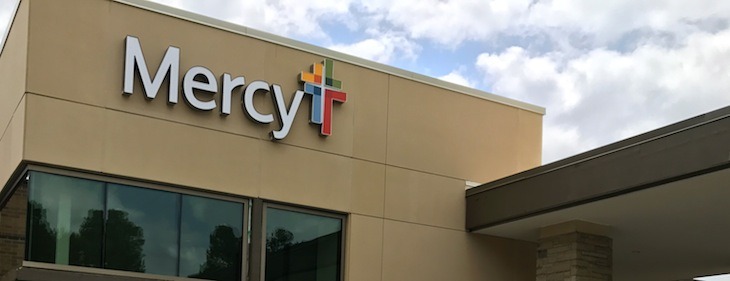Mercy to offer new screening blood test to detect cancer
by July 12, 2022 3:45 pm 2,090 views

A new blood test by Menlo Park, Calif.-based GRAIL is being offered at Mercy Health Systems. The Galleri test can detect early signs of more than 50 cancers, including aggressive ovarian, esophageal and pancreatic cancer for which no other screening tests are readily available.
“Recommended cancer screenings in the U.S. currently cover only five types of cancer – breast, cervical, colon, lung and prostate – and can screen just one at a time,” said Dr. Jay Carlson, clinical chair of Mercy Research, gynecologic oncologist and head of Mercy’s cancer specialty council. “This innovative test has shown the ability to screen for hard-to-detect, aggressive and often deadly types of cancer like pancreatic, ovarian and esophageal, which oftentimes have no warning signs and are caught too late.”
He said Mercy is early among health systems to offer this first-of-a kind test to patients. The test is not covered by insurance and costs $949. GRAIL does offer some flexible payment options for the Galleri test. Mercy also said it will work with patients who qualify for but are unable to pay the total cost.
The Multi-Cancer Early Detection (MCED) test, intended to complement U.S. guideline-recommended cancer screenings, looks for a shared signal present in the bloodstream that has been associated with many cancers. If a cancer signal is detected, the test can often pinpoint its origin in the body to help develop the next steps for treatment or additional diagnostic testing.
“Early detection can play a critical role in cancer treatment, allowing cancers to be caught when treatment is more likely to be successful,” said GRAIL CEO Bob Ragusa. “We believe new approaches, including multi-cancer early detection tests, are the new front in the war on cancer and one of our best chances to bend the cancer mortality curve. We’re excited to work with Mercy to offer the Galleri test to their patients.”
GRAIL said the MCED test is recommended for adults with an elevated risk for cancer, such as those aged 50 or older. Galleri is available by prescription only, and use of the test is not recommended for those who are pregnant, 21 years or younger or undergoing cancer treatment. Anyone interested in the Galleri test can visit Mercy’s early detection site to fill out a form and, if eligible, be contacted by a Mercy care navigator to walk them through the ordering and testing process.
The results are delivered two weeks after blood is drawn, and if a positive signal is detected, Mercy employees will coordinate additional testing and care. One of the first Mercy patients to schedule the test was Nancy Dixon, a Mercy employee in Oklahoma City.
“My dad died when he was 51 from pancreatic cancer, one of the worst cancers because once you know you have it, the cancer is too far gone,” Dixon said. “It’s always been a lingering fear. I was 16 then; I’m now 55. This test gives me some peace of mind rather than not knowing and just waiting. I wish my dad had been able to have access to this blood test. He might be alive today and know my daughter, his grandchild.”
The Galleri test trial has demonstrated the test’s ability to detect a shared signal from then 50 forms of cancer, 45 of which lack recommended screen tests. In clinical trials with more than 20,000 patients, the results showed Galleri had a 99.5% specificity with one false positive in a sampling of 200 patients. The origin of the cancer was found 89% of the time with the Galleri blood test. GRAIL said there is a 76.3% sensitivity in cancers that cause two-thirds of cancer-related deaths in the U.S.
Different cancers shed DNA into the bloodstream at different rates. The proportion of tumor-derived cfDNA in the blood tends to increase as cancer progresses. Cancers that shed more DNA at earlier stages tend to be associated with higher mortality. The greater the proportion of cfDNA in a sample, the stronger its signal and the more likely it is to be detected by the Galleri test. The Galleri test detected a cancer signal in approximately 3 out of 4 people with one of the cancers in this high-signal cancer group.
“Technology continues to push the boundaries on what we are able to do in medicine, making it more predictive, proactive and personalized for patients,” said Dr. John Mohard, Mercy chief clinical officer and communities president. He leads operations for all Mercy hospitals. “Early detection has the potential to give us more years with our loved ones, and that’s invaluable.”
Cancer survival is largely dependent on how early cancer is detected, The American Cancer Society reports 79% of cancer deaths are related to late detection, stage 3 or beyond. And a whopping 71% of cancer deaths result from those without recommended screening tests.
